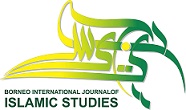From Usul Fiqh to Legal Pluralism: An Autoethnography of Islamic Legal Thought
Abstract
This article seeks to introduce an autoethnography as a method in studying Islamic law. Through an autoethnography, a scholar could share a unique and subjective experience, which would not only contribute to the understanding of social phenomenon but also reflect on possible different situations upon knowing the reality. It not only makes a sequence of events and their interpretation, but it also asks readers to emotionally ‘relive’ the events with the writer of autoethnography. This article uncovers processes and dynamics of my own thought in approaching and comprehending law in Islam including topics such as usul fiqh and legal pluralism. It discloses the development of my research interest and scope, both nationally and internationally in the past three decades. The article argues that knowledge is not necessarily produced by research work. In fact, personal narratives are considered scientific in that they could contribute knowledge to what we know about the world in which we live. And, last but not least, personal stories are valuable if they could: 1) provide a legitimate claim or justification, 2) offer something new to learn, and 3) help other people cope with or better understand world issues.
Keywords: autoethnography, Islamic law, legal pluralism, usul fiqh.
References
Al-Basri, Abu al-Husayn. Al-Mu`tamad Fi Usul Al-Fiqh. Damaskus: al-Ma`had al-`Ilmi, 1964.
Al-Shatibi, Abu Ishaq Ibrahim. Al-Muwafaqat Fî Usûl Al-Sharî’ah. Beirut: Dar al-Ma’rifah, 1999.
Bowen, John Richard. Islam, Law, and Equality in Indonesia: An Anthropology of Public Reasoning. Cambridge University Press, 2003.
Bowen, John and Arskal Salim (eds), Women and Property Rights in Indonesian Islamic Legal Contexts. Leiden: Brill, 2018.
Ellis, Carolyn “Creating Criteria: An Ethnographic Short Story”, Qualitative Inquiry 6 (2) 2000, pp. 273-277.
Ellis, Carolyn. The ethnographic I: A methodological novel about autoethnography. Walnut Creek: AltaMira Press, 2004.
Hallaq, Wael B. A History of Islamic Legal Theories: An Introduction to Sunni Usul Al-Fiqh. Cambridge: Cambridge University Press, 1999.
David Hayano, “Auto-Ethnography: Paradigms, Problems, and Prospects”. Human Organization 38 (1): Spring 1979, pp. 99-104.
Hooker, Michael Barry. Legal Pluralism: An Introduction to Colonial and Neo-Colonial Laws. Oxford: Clarendon Press, 1975.
Makdisi, George. “The Juridical Theology of Shâfi’î: Origins and Significance of Uṣûl Al-Fiqh.” Studia Islamica 59 (1984): 5–47.
Maréchal, Garance. Autoethnography. In Albert J. Mills, Gabrielle Durepos & Elden Wiebe (Eds.), Encyclopedia of case study research, Vol. 2. Thousand Oaks, CA: Sage Publications, 2010.
Modarressi, Hossein. Introduction to Shi`i Law: A Bibliographical Study. London: Ithaca Press, 1994.
Nasution, Harun. Teologi Islam: Aliran-Aliran, Sejarah Analisa Perbandingan. Jakarta: UIN Press, 1986.
Powers, David S. “Islamic Inheritance System: A Socio-Historical Approach.” Arab LQ 8, 1993, 13.
Rahman, Fazlur. “Functional Interdependence of Law and Theology.” In Theology and Law in Islam. Wiesbaden: Otto Harrassowitz, 1971.
Richardson, Laurel. “New writing practices in qualitative research, Sociology of Sport Journal 17 (2000), pp. 5-20.
Salim, Arskal. “Between ICMI and NU: The Contested Representation of Muslim Civil Society in Indonesia, 1990-2001.” Al Jamiah 49 (2), 2011.
______. Challenging the Secular State: The Islamization of Law in Modern Indonesia. University of Hawaii Press, 2008.
______. “Discourses on Democracy within Debates on Islam-State Relations in Indonesia.” Journal of Indonesian Islam 2 (1), 2008.
______. Etika Interventsi Negara: Perspektif Politik Ibnu Taimiyah. Jakarta: Logos, 1999.
______. “Islamic Law and the Issue of Gender Equality in Indonesia [Book Review].” Australian Journal of Asian Law 7, no.2, 2005, 187.
______. Partai Islam Dan Relasi Agama-Negara. Jaringan Pendidikan Pemilih Untuk Rakyat, 1999.
______. “Political Islam in Southeast Asia: In Inquiry into the Idea of an Islamic State in the Post-Soeharto Indonesia.” In Seeking Alternative Perspectives of Southeast Asia. Malaysia: Perak Academy, 2004.
______. “Zakat Administration in Politics of Indonesian New Order.” In Shari’a and Politics in Modern Indonesia. Singapore: Institute of South East Asian Studies, 2003.
Stewart, Devin J. Islamic Legal Orthodoxy: Twelver Shiite Responses to the Sunni Legal System. Univ of Utah Pr, 1998.
Wall, Sarah. “An Autoethnography on Learning about Autoethnography”, International Journal of Qualitative Methods 5 (2), June 2006.
Woodman, Gordon R. “The Idea of Legal Pluralism.” In Legal Pluralism in the Arab World, 3–19, 1999.


.png)






